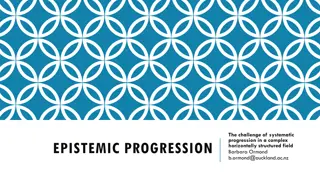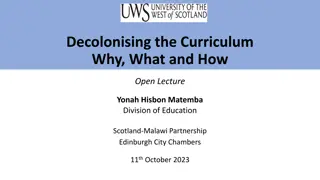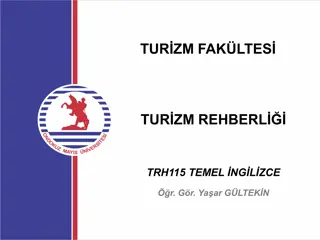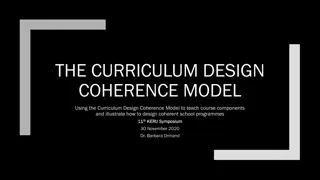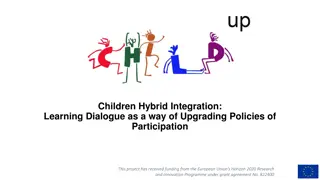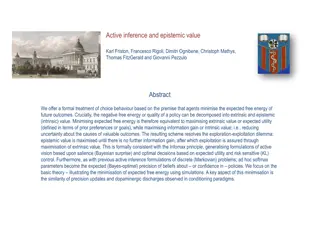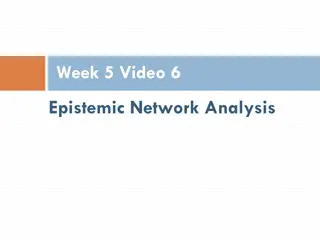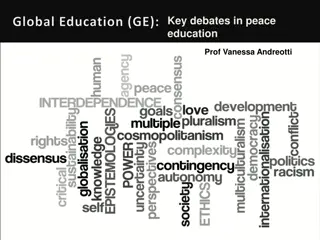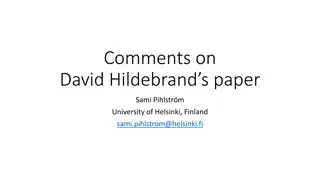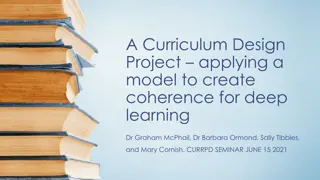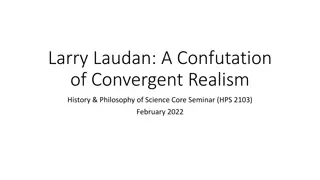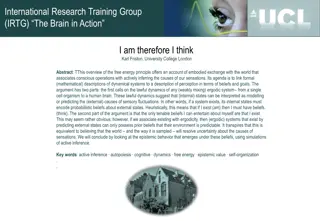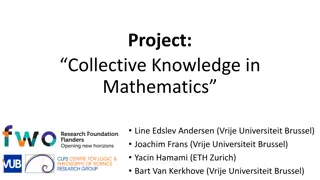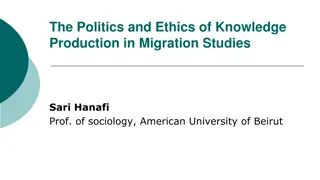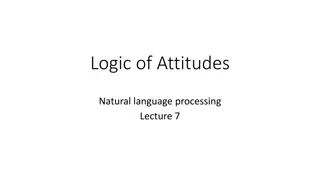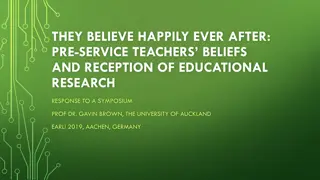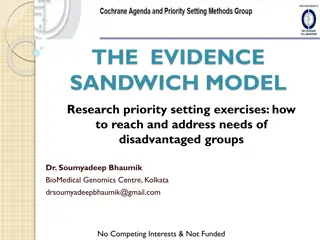Understanding Epistemic Progression in Learning: A Humanities Perspective
Exploring the concept of epistemic progression and its importance in education, this content delves into Basil Bernstein's theories on knowledge structure, trends in history education, and the role of procedural knowledge in fostering progression in disciplines like History.
1 views • 10 slides
Decolonising the Curriculum Why, What and How
Explore the complexities of decolonising the curriculum in Scottish education, addressing epistemic privilege, Black History Month, Scottish history and colonialism, missionary movements, and the nuances of the curriculum itself. Consider the purpose and impact of decolonisation efforts in reshaping
1 views • 24 slides
Understanding Modal Verbs: Epistemic and Deontic Uses
Modal verbs, such as can, could, may, must, will, and should, play a crucial role in expressing modality in English. This content discusses the epistemic and deontic uses of modal verbs, illustrating how they convey likelihood, ability, permission, suggestions, obligations, and advice. Explore the n
0 views • 34 slides
Enhancing Teaching Through Curriculum Design Coherence Model
Explore the use of the Curriculum Design Coherence Model (CDC) for designing effective lectures and guiding pre-service teachers in creating coherent lesson plans. Learn about epistemic progression, systematic ordering of knowledge, types of knowledge, and Bernsteins's knowledge structures to design
0 views • 26 slides
Enhancing Children's Hybrid Integration Through Dialogue in Education
Presenting research results on enhancing children's agency and hybrid integration through dialogic interactions in school settings, specifically focusing on children with migrant backgrounds. The project aims to propose effective facilitation methods to support the participation of children with mig
0 views • 28 slides
Exploring Inductive Inferences and Their Relation to Probability
Nevin Climenhaga delves into the world of inductive inferences, categorizing them into downward, upward, and sideways forms. He discusses connections with probability, confirmation, epistemic defeat, and more, emphasizing the distinction between direct and indirect forms of inferences.
0 views • 15 slides
Understanding Active Inference and Epistemic Value in Decision Behavior
This study presents a formal framework for decision-making, suggesting that agents minimize expected free energy of future outcomes by balancing extrinsic and epistemic values. By maximizing information gain and reducing uncertainty, agents navigate the exploration-exploitation dilemma. The strategy
0 views • 18 slides
Understanding Epistemic Network Analysis in Data Studies
Epistemic Network Analysis (ENA) is a method for studying relationships between elements in coded data with various applications. It involves analyzing nodes as occurrences of codes and links as co-occurrences of codes. Using examples like analyzing quitting behavior in a game, ENA can compare group
0 views • 30 slides
Exploring Key Debates in Peace Education by Prof. Vanessa Andreotti
Dive into the intricacies of peace education through the lens of Prof. Vanessa Andreotti, examining the Magolda Model of Epistemic Development. Explore themes such as violence vs. non-violence, complexity of human beings, empathy, critical thinking, and promoting heroic imagination towards cultivati
0 views • 12 slides
Reflections on Values and Identity in Research by David Hildebrand: A Critical Analysis
Delve into thought-provoking questions raised by Sami Pihlström on David Hildebrand's paper, exploring themes such as the impact of changing fundamental values on personal identity, the concept of reflective equilibrium in research methodologies, the significance of core values, the interplay betwe
0 views • 8 slides
Enhancing Curriculum Coherence for Deep Learning: A Model-driven Approach
Addressing the disconnect between conceptual knowledge and applied competencies in education, the Curriculum Design Coherence Model offers a structured framework to create coherence for deep learning. Developed in response to educational challenges such as skills versus knowledge imbalance and fragm
1 views • 28 slides
Critique of Convergent Realism by Larry Laudan
Larry Laudan's "A Confutation of Convergent Realism" challenges the notion of epistemic realism by arguing that historical evidence does not fully support it. He discusses Convergent Epistemological Realism (CER) and presents abductive arguments questioning the truth and empirical success of scienti
0 views • 18 slides
The Free Energy Principle and Active Inference in Cognitive Dynamics
This overview of the free energy principle by Karl Friston delves into how conscious operations are linked to inferring causes of sensations, emphasizing the necessity of probabilistic beliefs about external states. The discussion includes topics like embodied exchange with the world, ergodic system
0 views • 32 slides
Exploring the Intersection of Social Epistemology and Mathematics
Delve into the intertwining realms of social epistemology and mathematics, examining the collaborative knowledge creation within the mathematical community. This work emphasizes the social dimensions influencing mathematical practices and the epistemic norms shaping reliable mathematical knowledge.
0 views • 15 slides
The Politics and Ethics of Knowledge Production in Migration Studies by Sari Hanafi
This insightful study delves into the politics and ethics surrounding knowledge production in migration studies. It explores the normativity of migration studies, identity politics, and universalism, while emphasizing the importance of ethics and epistemic community. The discourse also touches upon
0 views • 16 slides
Understanding Propositional and Notional Attitudes in Logic and Natural Language Processing
Explore the intricate concepts of propositional and notional attitudes in the context of logic and natural language processing. Dive into the distinctions between belief, knowledge, seeking, finding, solving, wishing, and wanting within the realms of individual intensions and hyper-intensions. Under
0 views • 16 slides
Pre-Service Teachers' Beliefs and Reception of Educational Research
Exploring the awareness and trust of pre-service teachers in educational psychology misconceptions, epistemic trust in educational scientists, questioning prior beliefs when faced with evidence, and beliefs about the instrumental quality of information sources for teaching. The symposium delves into
0 views • 10 slides
Evidence Sandwich Model: Addressing Needs of Disadvantaged Groups
In a world of medical advancements, reaching those in resource-poor settings remains a challenge. The Evidence Sandwich Model explores ways to prioritize research, collaborate, and tackle implementation bottlenecks to deliver basic care to disadvantaged populations. Led by Dr. Soumyadeep Bhaumik, th
0 views • 18 slides
